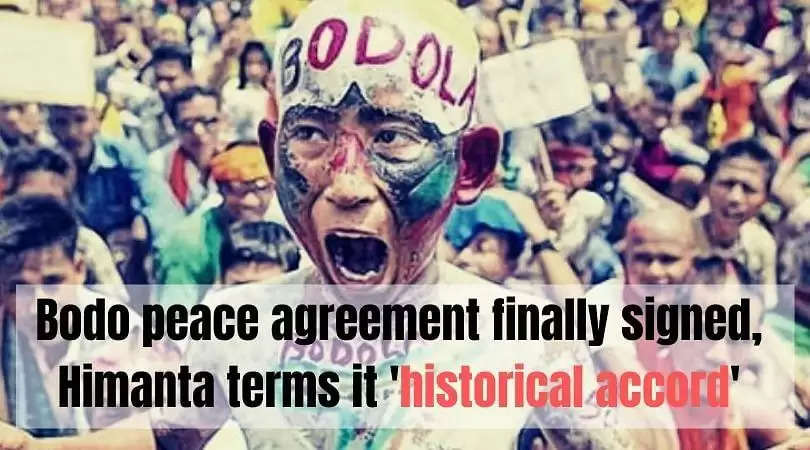Bodo peace agreement finally signed, Himanta terms it ‘historical accord’

GUWAHATI | JAN 27, 2020:
The central government today has signed an accord with one of the insurgent groups of Assam—the National Democratic Front of Boroland (NDFB)—providing political and economic bonanza.
The tripartite agreement was signed by Assam chief minister Sarbananda Sonowal, top leadership of the four factions of the NDFB, ABSU, joint secretary in the home ministry Satyendra Garg and Assam chief secretary Kumar Sanjay Krishna in presence of Union home minister Amit Shah.
Senior Assam minister Himanta Biswa Sarma also tweeted;
The #Bodo Peace Accord has full support of Assam government led by HCM @sarbanandsonwal & Bodoland Territorial Council (BTC) Chief Sri Hagrama Mohilary, making it full and final solution to the over decades old Bodo issue. Thank all those who made this historic Accord possible.
— Himanta Biswa Sarma (@himantabiswa) January 27, 2020
2/2 The #BodoAccord shall reaffirm the territorial integrity of Assam and at the same time usher us into a new hope of peace and progress in Bodoland. My best wishes.@PMOIndia @HMOIndia @CMOfficeAssam
— Himanta Biswa Sarma (@himantabiswa) January 27, 2020
The All Bodo Students' Union (ABSU), which has been spearheading a movement for a Bodoland state, was also a signatory to the accord.
"It is a historical accord," Union home secretary Ajay Bhalla said and asserted that the pact will bring comprehensive solution to the Bodo issue.
After the lone outfit demanding a separate Bodoland state, NDFB (Saoraigwra), came overground on January 11 and decided to join the peace parleys, the Centre expedited the process of reaching an "ultimate" solution to the Bodo issue festering since the late eighties.
All stakeholders of the Bodoland movement, including four NDFB factions, representatives of All Bodo Students' Union and People's Joint Action Committee for Boroland Movement have been camping in Delhi. NDFB chief Ranjan Daimary, sentenced to life imprisonment for his involvement in the Oct 30, 2008, serial bomb blasts, also flew to Delhi on Saturday, after being released on bail, to take part in the talks.
The proposed treaty is going to be the third such settlement with the Bodo groups since 1993, when the memorandum of settlement (Bodo Accord) signed in Guwahati on February 20, paved the way for setting up the Bodoland Autonomous Council.
Though the details of the accord are not yet clear and there have been assertions that the deal won't lead to creation of a new state or UTC, speculations about it are rife.
While Bodo groups have welcomed the deal, several non-Bodo organizations like All Koch Rajbongshi Students Union, All Bodo Minority Students Union, All Adivasi Students Union, Kalita Janagosthi Students Union etc have opposed creation of a new UTC.
There are speculations that the deal might lead to extension of authority of the Bodoland Territorial Council (BTC) beyond the four districts under Bodoland Territorial Area Districts (BTAD)—Chirang, Baksa, Kokrajhar and Udalguri—and include portions of Biswanath, Lakhimpur and Sonitpur districts.
However, ten years later, on February 10, 2003, the Assam government, the Centre and the Bodo Liberation Tigers (BLT) signed the memorandum of settlement to form the present Bodoland Territorial Council, which includes Kokrajhar, Chirang, Baksa and Udalguri districts. BPF, which runs the BTC, is the political avatar of the disbanded BLT.
Meanwhile, a 12-hour Assam bandh was called by various non-Bodo organisations in protest against the Centre's move to sign a peace accord with different Bodo stakeholders.

















